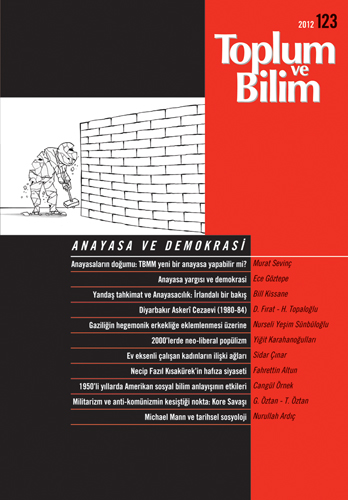Anayasaların doğumu: TBMM yeni bir anayasa yapabilir mi?
Murat Sevinç
Özet: Türkiye Cumhuriyeti’nin üçüncü anayasası olan 1982 Anayasası, kabulünden bugüne yaklaşık otuz yıldır tartışma konusu oldu. Önceki iki anayasa döneminde de anayasalar yine aynı hararetle tartışılmıştı. Kökenleri büyük ölçüde siyasal, toplumsal, kültürel ve ekonomik olan yaşamsal sorunların gerek ortaya çıkış gerekçeleri gerekse çözümleri, genellikle anayasa metinlerinde arandı. Oysa değerli anayasacı Mümtaz Soysal, yaklaşık elli yıl önce kaleme aldığı bir yazıda “anayasaları yaşatan içlerindeki sözcükler değil, dışarılarındaki hayattır.” demişti. Türkiye’deki siyasi mücadele tarzı ve hukuk algısı ise bu gerçeği bir türlü kabullenmedi. 1982 Anayasası, bir önceki gibi, askerÎ darbe sonunda hazırlandı ve ilk şekli son derece faşizan düzenlemelerle doluydu. 2011 yılına dek yaklaşık yarısı değişti. Ancak sözü ve ruhu üzerindeki tartışma hiç bitmedi. Bugün, yeni bir anayasa yapılması gündemde ve okuyacağınız yazı, yeni bir anayasanın doğum koşulları, anayasaların yapım gerekçe ve yöntemleri üzerinde durarak günümüz Türkiyesi üzerine bir söz söylemeye çalışıyor.
Anahtar sözcükler: Anayasa yapımı, değişiklikler, konsensüs, hukuksallık, meşruiyet
***
Birth of constitutions: Can the Turkish Grand National Assembly make a new constitution?
Murat Sevinç
Turkey’s 1982 Constitution has been deemed controversial almost until the day it was amended. Previous constitutions (the 1924 and 1961 Constitutions) were subjected to the same criticism. In Turkey, all vital dilemmas emerging from political, economic and social factors have been described as “trouble caused by the constitutions.” However, Prof. Mümtaz Soysal, one of the most prominent people in this field, used to emphasize almost fifty years ago that, “what gives a life to Constitutions is not the words themselves but the life they shape.” Turkey’s political tradition and the dominant perception of law in the country have never overlapped with this vital reality. The semi-authoritarian 1982 Turkish Constitution was ratified after the military coup in 1980, as the Constitution of 1961, the original text, was full of anti-democratic clauses. Almost half the 1982 Constitution has been amended until 2011. However the controversy regarding both the letter and the spirit of the Constitution has not ceased. In the present day “The New Constitution” is on the agenda and in this article the author tries to explore the birth conditions surrounding the new constitution, possible constitution-making procedures and the democratic legitimacy of the constituent authority.
Keywords: Constitution-making, amendments, consensus, legality, legitimacy

